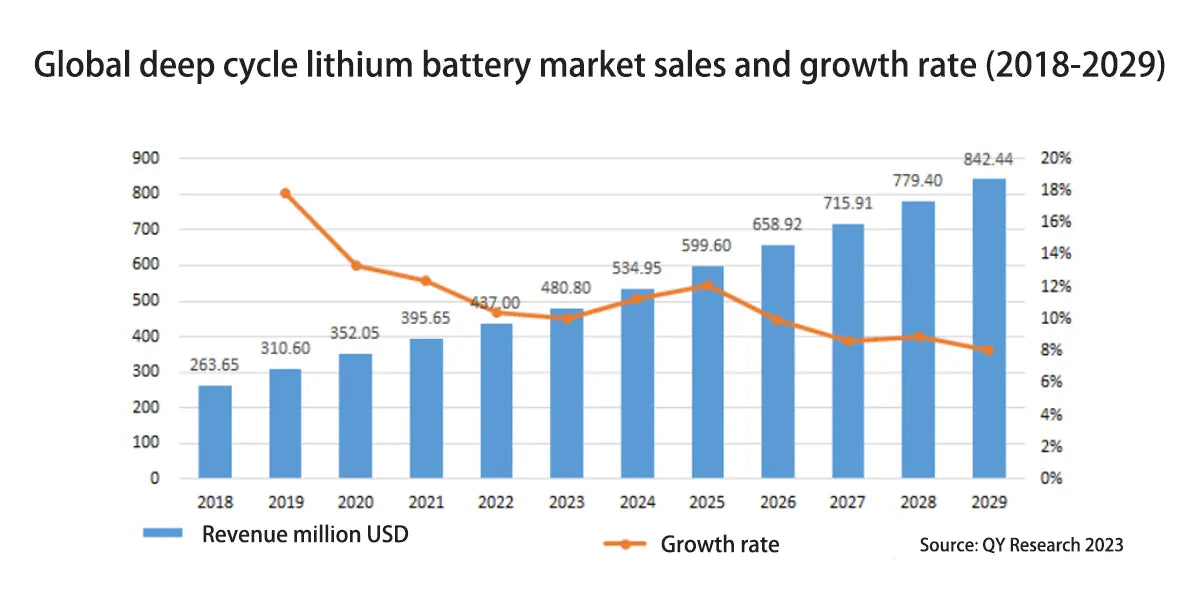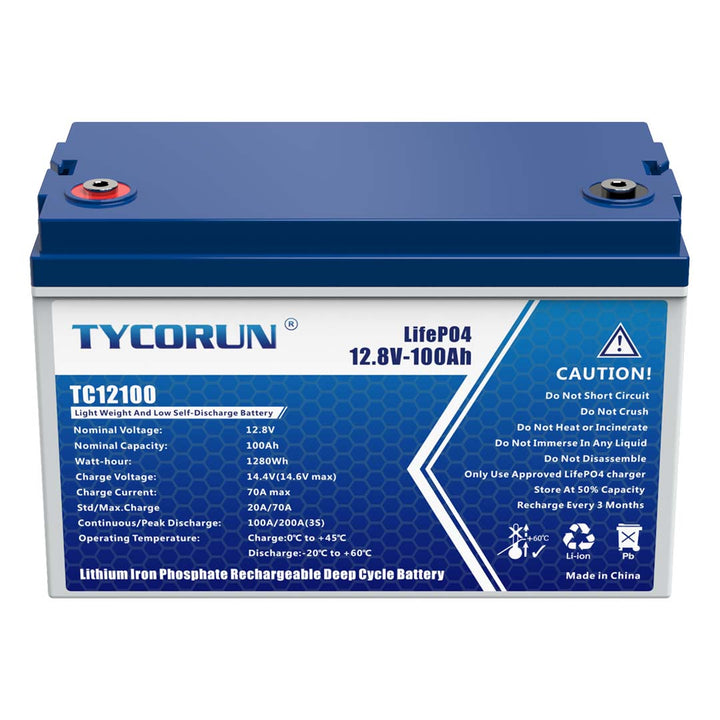
Main content:
1. What is deep cycle lithium battery
A deep cycle lithium battery refers to a rechargeable battery that is specifically designed to provide stable and reliable power for extended periods of time while being able to withstand repeated charge and discharge cycles.
These batteries are commonly used in applications that require long-lasting power, such as renewable energy systems, electric vehicles, recreational vehicles (RV), marine equipment, and off-grid power systems.
Lithium batteries are known for their high energy density, which means they can store a lot of energy in a relatively compact size. Deep cycle batteries are designed to handle deep discharges on a regular basis without significant performance degradation or loss of capacity.

The construction of deep-cycle lithium batteries involves the use of lithium iron phosphate (LiFePO₄) or lithium nickel manganese cobalt oxide (NMC) chemistries. Compared to other lithium battery chemistries, these chemistries offer advantages such as higher energy density, longer life, and better performance under harsh conditions. Deep-cycle batteries can be discharged to a lower state of charge (SOC) without negatively affecting their overall lifespan or capacity.
Overall, the main distinguishing feature of a deep-cycle battery is its ability to provide consistent power output over long periods of time, tolerate deep discharges, and withstand numerous charge and discharge cycles while maintaining its performance and capacity.
2. Development trend of deep cycle lithium battery market
① Higher energy density
A prominent trend in the deep-cycle lithium battery industry is the constant pursuit of higher energy density. Manufacturers are focused on developing battery chemistries and battery designs that can store more energy per unit volume or weight. This trend aims to increase the capacity and runtime of deep-cycle lithium batteries, enabling longer-lasting power storage solutions.
② Security
Safety is a key issue in the lithium battery industry. To address this, there is a trend to incorporate advanced safety features into deep-cycle batteries. This includes enhanced battery management systems that monitor and regulate battery performance, temperature control mechanisms and improved battery design to minimize the risk of thermal runaway or other safety incidents.

③ Smart Technology
Another emerging trend in the deep-cycle lithium battery industry is smart technology. This involves the use of advanced monitoring and communication systems that provide real-time data on battery health, state of charge and other relevant parameters. Smart technology enables better control, diagnostics and predictive maintenance to optimize the performance and life of deep-cycle batteries.
④ Sustainable Development
As sustainability becomes the focus of various industries, the demand for environmentally friendly and sustainable energy storage solutions is also increasing. Deep-cycle lithium batteries fit this trend with their longer life, recyclability and lower environmental impact compared to lead-acid batteries. Manufacturers are actively working to reduce the use of key materials and improve the recyclability and overall sustainability of deep-cycle lithium batteries.
⑤ Electric Vehicles (EVs)
The rapid growth of the electric vehicle market is driving the huge demand for deep-cycle lithium batteries. Electric vehicle manufacturers are increasingly opting for lithium-ion batteries due to their higher energy density, longer life and faster recharging capabilities. As the adoption of electric vehicles continues to rise, the deep cycle battery industry is witnessing an increase in production capacity and technological advancements to meet the growing demand.

3. Analysis of current status of deep cycle lithium battery industry
The deep-cycle lithium battery industry has been experiencing substantial growth in recent years. This can be attributed to the increasing demand for energy storage solutions across various industries, including renewable energy, electric vehicles, and portable electronics. The market is expected to continue expanding owing to the ongoing transition to clean energy and rising adoption of electric vehicles.
The continuous advancement of lithium battery technology has improved the performance and efficiency of deep cycle batteries. Manufacturers are investing in research and development to increase energy density, increase cycle life, and improve safety features. These advancements are driving the market and attracting more customers to choose deep-cycle lithium batteries over other battery technologies.

The continuous advancement of lithium battery technology has improved the performance and efficiency of deep-cycle lithium batteries. Manufacturers are investing in research and development to increase energy density, increase cycle life, and improve safety features. These advancements are driving the market and attracting more customers to choose deep-cycle lithium batteries over other battery technologies.
The shift towards clean energy and sustainable development has led to an increasing focus on environmentally friendly battery solutions. Compared to lead acid batteries, deep-cycle batteries are considered more environmentally friendly due to their lower carbon footprint, longer life and recyclability. This environmental advantage is attracting companies and governments that prioritize sustainability.
Deep-cycle lithium batteries have applications in a variety of industries beyond traditional industries such as automotive and consumer electronics. They are being deployed in off-grid power systems, marine vessels, data centers, telecommunications, and more. This widening range of applications demonstrates the versatility and adaptability of deep-cycle lithium batteries in meeting the power storage needs of various industries.
4. Overall scale analysis of global deep cycle lithium batteries market
Lithium batteries can not only avoid environmental pollution, but also facilitate people's life and work. Thanks to the development of lithium batteries, researchers can now turn different static gadgets, appliances, and devices into portable ones that can be powered by the electricity stored in the batteries. Their mass and other deficiencies have hindered the widespread applicability of conventional batteries.
However, modern lithium-ion energy storage technology has been improved to address all of the shortcomings of the previous generation. The development of lead-acid batteries has a history of about 150 years. Lithium-ion batteries are the best deep-cycle batteries out there, and they have new features to meet the demands of modern life.
The increasing adoption of electric vehicles presents a significant opportunity for the deep-cycle lithium battery industry. As governments around the world push for sustainable transportation, the demand for high-performance, long-life batteries is increasing.
Deep-cycle lithium batteries offer advantages such as longer driving range, faster charging times, and higher overall efficiency. Continued advancements in battery technology and cost reductions will further drive the growth of the electric vehicle market, creating a larger market for deep-cycle lithium batteries.
According to the statistics and forecasts of QYR, the global deep-cycle lithium battery market will reach US$437 million in 2022, and is expected to reach US$842 million in 2029, with a compound annual growth rate (CAGR) of 9.80%.

- From a regional perspective, the Chinese market has changed rapidly in the past few years. The market size in 2022 will be US$52.30 million, accounting for about 11.97% of the global market. It is expected to reach US$112.50 million in 2029, and the global share will reach 13.35% %.
- At present, major global manufacturers include Dakota Lithium, Drypower, RELiON Batteries, iTechworld, and Renogy, etc., and the share of major manufacturers will exceed 40% in 2022. It is expected that industry competition will become more intense in the next few years.
- In terms of consumption, North America is currently the largest consumer market in the world, accounting for 30.20% of the market in 2022, followed by Europe at 22.76%. It is expected that in the next few years, China will grow the fastest, with a CAGR of approximately 11.52% during 2023-2029.
- From the perspective of production, North America and China are two important production regions, which will respectively occupy 42.90% and 27.29% of the market share in 2022. It is expected that the European region will maintain the fastest growth rate in the next few years, and its share is expected to reach 11.11%.
- In terms of product types, 12V occupies an important position, and its share is expected to reach 48.24% in 2029. At the same time, in terms of application, the share of vehicles in 2022 will be about 35.26%, and the CAGR will be about 10.14% in the next few years.
Click on the picture for product details of Tycorun 12v 100Ah Lithium Deep Cycle Battery
Lithium battery technology continues to innovate, especially in areas such as lithium battery density, regeneration, extraction technology, and ecological chain applications, and promotes continuous changes in the value chain competition pattern. The lithium battery industry is still in the growth stage of technology-driven development.
In addition, recycling battery materials will become a new development direction. Many companies around the world have begun to develop battery recycling technology, which will play a positive role in the sustainable development of the lithium-ion battery industry.
Related articles: deep cycle lithium ion battery, long lasting battery, 6V vs 12V battery

















